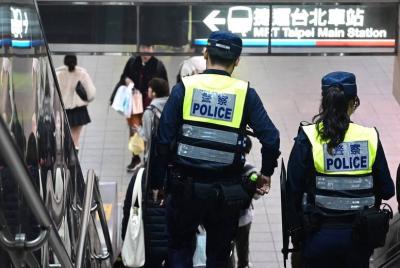The Chinese Nationalist Party (KMT) is trying to improve its image in the US’ foreign policy community by admitting faults and professing humility.
KMT spokesman Charles Chen (陳以信) published a seemingly frank article — “How Taiwan’s Ruling but Reeling Kuomintang Can Win the Future” — on Foreign Policy magazine’s Web site on Tuesday.
He said the KMT was “in the throes of reform” and aiming for a major restructuring.
Washington insiders say the KMT lost some credibility and support in the US following the defeat it suffered in November’s local elections.
It took another blow when Representative to the US Shen Lyu-shun (沈呂巡) broke with diplomatic protocol and a longstanding agreement when he acted without prior consultation or authorization and organized a Republic of China (ROC) flag-raising ceremony at the Twin Oaks Estate — Taipei’s unofficial embassy in Washington — last month.
At the same time, the Democratic Progressive Party (DPP) has made progress in persuading US officials that it can be trusted to handle cross-strait relations with care and responsibility.
“The question now is what the KMT can do to turn things around,” Chen said.
“In retrospect, it’s hard to miss the major reasons for the KMT’s recent losses,” he said.
Taiwanese have not shared the fruits of economic growth equally, and the party has failed to “satisfy the thirst” that many civic groups have shown for greater involvement as well as failed to answer the complaints of angry and organized protesters, he said.
“Even worse, the KMT has sometimes chosen to stand against street protesters,” he said, citing the case of the Sunflower movement.
It was the KMT’s “harsh response” — including the forceful evacuation of students from the Executive Yuan — “that most alienated voters, particularly young ones,” he said.
“The KMT must improve its relationship with civic opposition groups — instead of opposing them or freezing them out of the decisionmaking process,” he said.
“We need to actively communicate with them, and channel their appeals into actual reforms,” the spokesman said.
Chen said the KMT also needed to change the way it communicated in the online world.
“Instead of treating the Internet as a platform promoting policies we’ve already decided upon, we must use it to proactively engage and encourage public participation at the policy shaping stage,” he said.
Communications had been from the top down, not from the grassroots level up, he said.
“What matters most now is our ability to turn things around,” he wrote. “It begins with the humility to accept criticism and the courage to reform. Recognizing our faults is only the start.”

Beijing could eventually see a full amphibious invasion of Taiwan as the only "prudent" way to bring about unification, the US Department of Defense said in a newly released annual report to Congress. The Pentagon's "Annual Report to Congress: Military and Security Developments Involving the People's Republic of China 2025," was in many ways similar to last year’s report but reorganized the analysis of the options China has to take over Taiwan. Generally, according to the report, Chinese leaders view the People's Liberation Army's (PLA) capabilities for a Taiwan campaign as improving, but they remain uncertain about its readiness to successfully seize

Taiwan is getting a day off on Christmas for the first time in 25 years. The change comes after opposition parties passed a law earlier this year to add or restore five public holidays, including Constitution Day, which falls on today, Dec. 25. The day marks the 1947 adoption of the constitution of the Republic of China, as the government in Taipei is formally known. Back then the Chinese Nationalist Party (KMT) governed China from Nanjing. When the KMT, now an opposition party in Taiwan, passed the legislation on holidays, it said that they would help “commemorate the history of national development.” That

Taiwan has overtaken South Korea this year in per capita income for the first time in 23 years, IMF data showed. Per capita income is a nation’s GDP divided by the total population, used to compare average wealth levels across countries. Taiwan also beat Japan this year on per capita income, after surpassing it for the first time last year, US magazine Newsweek reported yesterday. Across Asia, Taiwan ranked fourth for per capita income at US$37,827 this year due to sustained economic growth, the report said. In the top three spots were Singapore, Macau and Hong Kong, it said. South

Police today said they are stepping up patrols throughout the Taipei MRT system, after a social media user threatened to detonate a bomb at an unspecified station this afternoon. Although they strongly believe the threat to be unsubstantiated, Taipei Metro police and the Railway Police Bureau still said that security and patrols would be heightened through the system. Many copycat messages have been posted since Friday’s stabbing attacks at Taipei Main Station and near Zhongshan MRT Station that left three dead and 11 injured, police said. Last night, a Threads user in a post said they would detonate a bomb on the Taipei